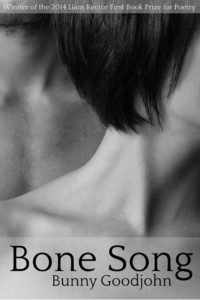 Review by Mara I. Amster
Review by Mara I. Amster
– It has long been my pleasure to introduce upper-level students to my colleague Bunny Goodjohn’s first novel, Sticklebacks and Snow Globes (The Permanent Press, 2007). The novel brings readers into the 1970s world of British council flats, adolescent girls, and the pains and pleasures they undergo as they navigate their lives within and outside their front doors. It is a book that makes me want to open it again as soon as I have finished it.
Goodjohn’s first poetry collection, Bone Song, the winner of the 2014 Liam Rector First Book Prize for Poetry, shows us what that world might look like once those girls have grown up. It is a world full of love and violence, loss and renewal, of memories and storytelling. It is, I admit, not an easy world to enter — there may be tears, there will certainly be moments when your breath stops short at a line or a turn of phrase — but it is a world very much worth exploring.
Throughout the collection, Goodjohn examines the ways in which we tell certain stories and choose to bury others; she investigates how we shape our past deliberately in order to make our present palatable and our future imaginable. The opening poem, “First,” establishes these ideas with its repetitive mantra: “If you ask for my first, I will tell you this . . . I will not tell you of the man . . . I will not tell you how the first . . . I will not tell you how he asked . . . I will not tell you / any of this.” What is told, by not telling, is how a story of naïve teenage love becomes one of marital abuse and violence.
The unexpected turn in “First” — teenagers “huddled giggling and naked on the couch” in the fourth stanza morph, by the eighth, into a man who “stripped me naked in the grass” — provides the pattern for many of the poems where surface appearances are complicated by not-fully buried truths. The extended description of the anonymous perks of hotel rooms in “Hotel” — “doll bottles of pearly shampoo and conditioner; / a cake of soap, virgin curved to fit my palm” — give way to the confession: “I used sex — illicit and fumbled — / to wreck a marriage.” Whose marriage it is that has been shattered, the narrator’s or her partner’s, is never elaborated nor does it need to be.
Destruction feels final and becomes more extreme in other poems. The portrait of a friend’s “mole on the side of [her]mouth” proves to be a cancer that “feed[s]/ on everything [she]had left to tell me” (in “Conversation at Tastee-Freeze: Stage Four”). And, yet, this pain, unearthing what has been submerged, brings with it unexpected moments of beauty: “one day you would call me beautiful; / and I would hear you.” My critical disclaimer: I knew the woman for whom this poem was written and Goodjohn’s vision of “hair wild and wind-knotted,” of “sticky palms” and a voice that says “It’s okay” is heart-breaking.
It has become something of a cliché to say that this particular poet is a “writer’s writer.” The term implies that the poet uses form, space, and line in a way that flatters those readers who understand the history and nuances behind those particular literary choices. This is not to say that this collection is devoid of traditional forms; indeed, Goodjohn takes joy in playing with form: the sonnet (‘How to Train a Dog”), the sestina (“Grain”), and the ghazal (“Hard to Believe”) among others. Yet, I would never argue that Goodjohn is a writer’s writer; she is reader’s writer and, even more, she is a woman’s writer. She writes, pointedly and poignantly, about being a woman: a lover, a friend, a daughter, a sister, a wife and ex-wife, a parent to dogs and one’s chosen family. She writes about waiting — in hotel rooms, in veterinary clinics, in prison, in hospitals — and leaves us wondering if these moments in between events might be, after all, the moments that matter most.
BONE SONG
By Bunny Goodjohn
Briery Creek Press 2015
55 pp
Mara I. Amster is an associate professor of English literature at Randolph College in Lynchburg, VA. She is currently working on a book that examines the figure of the seventeenth-century fictional English prostitute as she stands at the juncture in time where anxiety about markets met anxiety about gender and sexuality.
